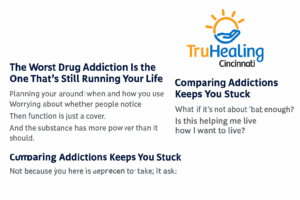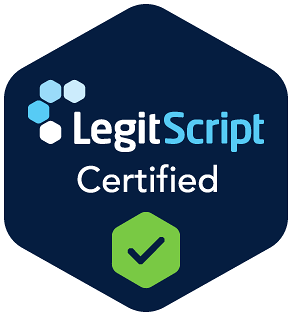You’re not trying to win the “worst addiction” contest. You’re trying to figure out if what you’re dealing with is bad enough to warrant help.
Maybe your substance of choice isn’t heroin. Maybe it’s Adderall, or weed, or pills that technically came from a doctor.
Maybe you’re still going to work. Still making it to the gym. Still showing up.
And still, you’re wondering: What kind of drug addiction is the worst?
That’s not just a clinical question. That’s a personal one. And it’s usually coming from a place of exhaustion—the quiet kind no one sees. The kind that doesn’t leave track marks or DUI records, but still eats at you.
Let’s talk honestly about why that question might not be helping you—and what you could ask instead.
The Worst Drug Addiction Is the One That’s Still Running Your Life
We get it. You’re high-functioning. Most days, you keep your life on track.
But if you’re constantly:
- Planning your day around when and how you’ll use
- Worrying about whether people notice
- Waking up promising to cut back, only to repeat the cycle
Then function is just a cover. And the substance has more power than it should.
The “worst” addiction isn’t the one that crashes fast.
It’s the one that slowly bleeds your peace, one “almost fine” day at a time.
It convinces you to wait. To manage. To hide.
Until one day you realize you haven’t felt fully okay in a long time.
Comparing Addictions Keeps You Stuck
When people ask what kind of addiction is the worst, they’re usually hoping the answer is not theirs.
If heroin is worse, then my Adderall use is fine.
If meth is worse, then my wine every night isn’t a big deal.
If someone else is worse, then maybe I can keep this up a little longer.
But pain doesn’t need to be the worst to be real.
You don’t need to lose everything to know something’s not working.
All substances can become dangerous:
- Benzos can rewire your nervous system.
- Weed can mute motivation and mask depression.
- Adderall can create dependence that’s hard to spot because it’s “productive.”
- Alcohol might be legal—but it still breaks lives in slow motion.
So instead of asking, Is my addiction bad enough?
Ask, Is this helping me live how I want to live?
The Hardest Addiction to Treat Is the One Nobody Sees
We work with a lot of high-achieving professionals at TruHealing Cincinnati.
Lawyers. Teachers. Entrepreneurs. Parents. People who don’t fit the stereotype—and who often keep themselves from seeking drug addiction treatment because they’ve learned to “handle it.”
But high-functioning doesn’t mean high-quality of life.
The hardest addiction to treat isn’t the most dramatic. It’s the most hidden.
Because there’s a layer of denial wrapped in competence.
Because everyone around you thinks you’re doing fine.
Because asking for help feels like confessing to something people didn’t even know was a problem.
And that’s where this gets dangerous.
Not because you’re weak. But because you’ve gotten really good at managing the unmanageable.

What If It’s Not About “Worst”? What If It’s About “Enough”?
The question that changes everything isn’t:
Is this the worst kind of drug addiction?
It’s:
Am I tired of feeling like this?
Are you tired of the 2 a.m. guilt?
Of hiding the bottles or counting the pills?
Of planning your day around your supply chain?
Of wondering if the anxiety you feel is just withdrawal in disguise?
If you’re already asking these questions, you don’t need to justify needing help.
You’re allowed to want something better.
That’s what real drug addiction treatment is for.
What Treatment Actually Looks Like (Not the TV Version)
If you’re imagining cold-turkey detox, group therapy with strangers, and endless platitudes about hitting rock bottom—you’re not alone.
But the reality is often very different.
At TruHealing Cincinnati, treatment is personalized and private.
We meet you where you are. We work with your story. We help you find what’s underneath the use—so you can heal the source, not just suppress the symptoms.
Whether you’re in Cincinnati or looking for drug addiction treatment in Springfield, Ohio, our programs are built to support high-functioning people who are finally ready to stop performing and start recovering.
You’re not a project. You’re a person. And you don’t have to carry this alone.
This Isn’t About Hitting Bottom. It’s About Raising the Bar.
You don’t have to fall apart to want more.
You can have a steady job and still be tired of waking up anxious.
You can hit deadlines and still dread your reflection.
You can “look fine” and still not be.
Your rock bottom doesn’t have to be dramatic. It can be a quiet moment of clarity.
A choice.
To stop managing.
To stop justifying.
To stop wondering how bad it has to get before it’s “bad enough.”
If that’s you, we’re here.
Call (888) 643-9118 or visit TruHealing Cincinnati’s drug addiction treatment program to find a path that meets you where you are—clear-eyed, still standing, and ready to feel like yourself again.
FAQs: What High-Functioning Clients Often Ask
Is high-functioning addiction really that serious?
Yes. It’s serious because it’s sustainable—until it’s not. Just because you haven’t hit a public crisis doesn’t mean your health, mental wellbeing, or relationships aren’t being slowly eroded.
What makes drug addiction treatment effective for people like me?
A personalized, respectful approach that doesn’t rely on shame. You need care that honors your intelligence, values your time, and helps you unpack the deeper patterns driving your use.
How do I explain this to my family or employer?
We can help with that. Many clients navigate this with grace using medical leave options or discreet support. You’re not alone—and you don’t need to announce it to everyone to get better.
What if I relapse? Does that mean treatment failed?
Not at all. Recovery is a process. Relapse isn’t proof you can’t heal—it’s proof that something deeper still needs attention. That’s what treatment helps uncover.


